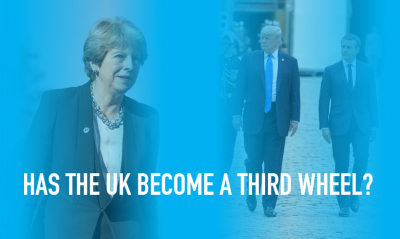Last weekend saw a joint mission to engage in airstrikes on strategic locations in Syria. This campaign was the West’s reaction to the use of chemical weapons, yet again by the Russian backed Assad regime. This mission involved a combined offensive from the American, French and British air forces, and on Sunday evening was declared a success by President Trump in a “Mission Accomplished” victory tweet.
The media focus in the aftermath of the airstrikes centred on Parliamentary consent for military engagement. However, one key point that was seemingly overlooked is President Macron’s ability to persuade President Trump to engage in military action on foreign soil. This was an interesting development in geopolitics, especially because the supposedly isolationist US President actively sought direction from the French President. This raises the question: should we be concerned about the blossoming relationship between the USA and France?
The roots of the UK-USA ‘special relationship’ date back almost 100 years to WWI and the shared bond Winston Churchill and Franklin D. Roosevelt formed towards the end of the war. Despite its longevity, these relations have undoubtedly been strained recently, evidenced by President Trump postponing his first official trip to the UK because of the threat of mass protests.
Many factors affect the strength of any relationship between global leaders. One of the most important factors is of course personalities. Historically, when both sides of the special relationship are governed by a strong personality the alliance has strengthened, for example with the Thatcher and Reagan friendship or the Bush Jr and Blair duo. This has not necessarily been the case between the USA and France in the past, with Bush and Chirac famously not seeing eye to eye.
With personalities so important, could this be a cause for concern for the British? There are many reports that Theresa May and Donald Trump are often not on the same wavelength, which tests the ‘special relationship’, as seen with the Bombardier vs Boeing row. It seems President Trump does not respect the Prime Minister, which might be because she is too soft when confronting him. Ironically, President Macron seems to have found a way of charming President Trump by being tough, displaying power and reasserting French interests. As a result, relations between the two countries have thrived. Maybe the Prime Minister should take some notes from the French?
There is however more to the ‘special relationship’ than the personalities of its leaders at any one time. Our two countries have a shared history, shared values, speak a common language and have legal systems based on the same principles. Our economies are also tightly linked by trade, frequent travel and have the world’s two leading financial centres. The ‘special relationship’ is also rooted in a deep cultural exchange, from music to art to film, we are deeply connected to our American cousins. One need only look at the number of British winners at this year’s Oscars to see how strong the bond is.
Given this, I do not believe that the UK should be concerned with the emergence of President Macron on the geopolitical scene and the early signs of a bromance he may share with President Trump. The ever-volatile Trump may lose interest in Macron before long, but more importantly, our ‘special relationship’ with the USA will long outlast these two Presidencies.




